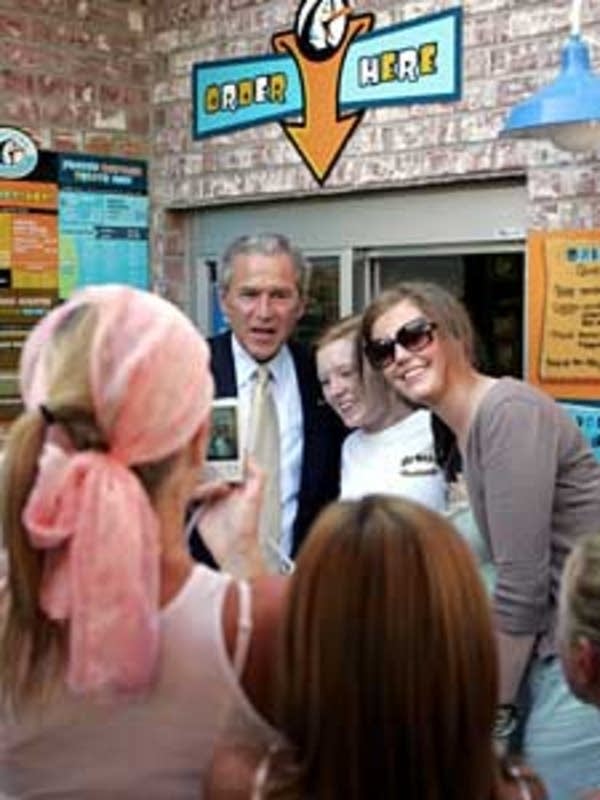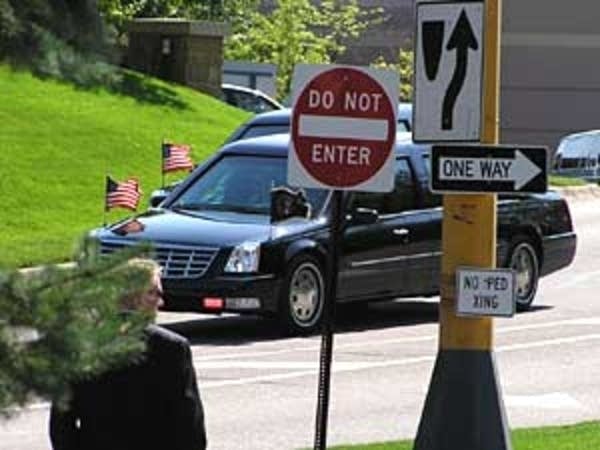Bush focuses on health care 'transparency' in Minnesota visit

In his health care forum, President Bush promoted the notion that arming Americans with specific information about the quality and price of health care is criticial, if the nation is to get under control the ever-increasing cost of health care.
Proponets of "transparency" -- the president among them -- argue that if consumers had more information they would begin shopping around for health care, weighing price and quality in the same way someone might buy a house or a car.

That pressure from newly cost-conscious consumers, and ensuring competition for business, the argument goes, would transform the health care industry into one that's more efficient and more affordable.
"If we have more consumer involvement in health care, then it makes sense ... to make sure consumers have got rational data from which to make choices. And that's not the case today in medicine," said Bush. "I don't know how many of you all have ever said, 'Gosh, I wonder how much this procedure is going to cost me, or before I go to see this person I want to know how much it costs, or maybe I need to know how much this hospital charges.' I doubt many of you have done that. I think the new trend in medicine is going to be to encourage transparency."
Create a More Connected Minnesota
MPR News is your trusted resource for the news you need. With your support, MPR News brings accessible, courageous journalism and authentic conversation to everyone - free of paywalls and barriers. Your gift makes a difference.
Joining Bush for the forum were Secretary of Health and Human Services Mike Leavitt, and some local health care industry and business leaders.
Among them Micheal Howe, the CEO OF Minnesota-based MinuteClinic. Howe explained to the president how his clinics offer consumers up-front pricing.

"In each of our clinics, we post a message board that lists the services and the prices the consumer is going to pay before they ever come in," said Howe.
Bush signed an executive order which Secretary Leavitt said would both require -- and offer incentives for -- health care groups that do business with the federal government to standardize medical record-keeping, and provide quality of care and price information.
"This will move us a big step forward becuase it's going to say, basically, if you're going to do business with the fed government or large employers who are joining with us, and unions and states like the state of minnesota, you'll use these electronic standards to be able to allow for the interchangeability, the interoperability of records.
Bush also heard about an effort among Minnesota's largest HMOs to provide consumers with side-by-side comparative data on the quality of services at primary care providers in Minnesota.
Bush called Minnesota a state that's fortunate to be taking a leadership role in providing consumers with health care information and choices.

He cited laser surgery, a now common procedure to correct vision, as an example of how competition in the health care industry improves customer service and brings down prices.
"Lasik surgery, eye surgery -- it's a procedure that cost a lot of money when it first came on, and yet there was quite a bit of competition" among doctors to provide the service, Bush said. "All of sudden the cost of Lasik surgery has dropped precipitously. It's now an affordable procedure. Markets work when consumers have got options to make in the marketplace."
Several times during the nearly hour-long forum, Bush repeated his oft-stated call for changes in the legal system to prevent what he refers to as frivolous lawsuits. Bush has long maintained lawsuits drive up the cost of health care and force some providers out of business.
University of Minnesota health policy economist Roger Feldman says it makes sense for consumers to have more information about health care. Why, Feldman asks, wouldn't someone who labors over quality statistics of cars, for example, not want to know what they're getting for a $50,000 operation?
I think both sides have taken this issue and over-politicized it.
The problem, Feldman says, is right now there's simply not enough good information available to consumers to effectively make those choices.
"The concerns I would have about transparency is that the information which is being produced, and the information which I have available to me, is the right information that I need to make an informed decision," says Feldman. "Going back to the car anology again, I can find out pretty much what I want to know about an automobile. But there still is a real question whether I can find out about the things that really matter to me about health care."
President Bush has often said that Americans shopping for health care with the relatively new pay-as-you-go health savings accounts will help force transparency in the industry.
But Feldman says because only a small percentage of peole are using HSAs, as they're called, that force alone won't likely be enough to change the system.
Given the magnitude of what many characterize as a health care crisis in the U.S., Feldman says politicans on both sides of the aisle should be doing more together to bring consumers more information about health care.
Feldman says pressuring health care providers that do business wih the federal government to become more transparent would be effective.
"I think there is definitely a role for the government to play here. ... I think both sides have taken this issue and over-politicized it," Feldman says. "The Democrats can't hear anything about President Bush without seeing red, including some very good ideas like promoting quality in the federal employees' plan. And the president has politicized any opponent of his proposals as being against peace, light and harmony. An example of that would be the debates over malpractice reform."
As Bush held his forum inside the Minnetonka hotel, about 75 people demonstrated nearby, calling for universal health care coverage. They also protested against the war in Iraq, and more broadly, the Bush-Cheney administration.
